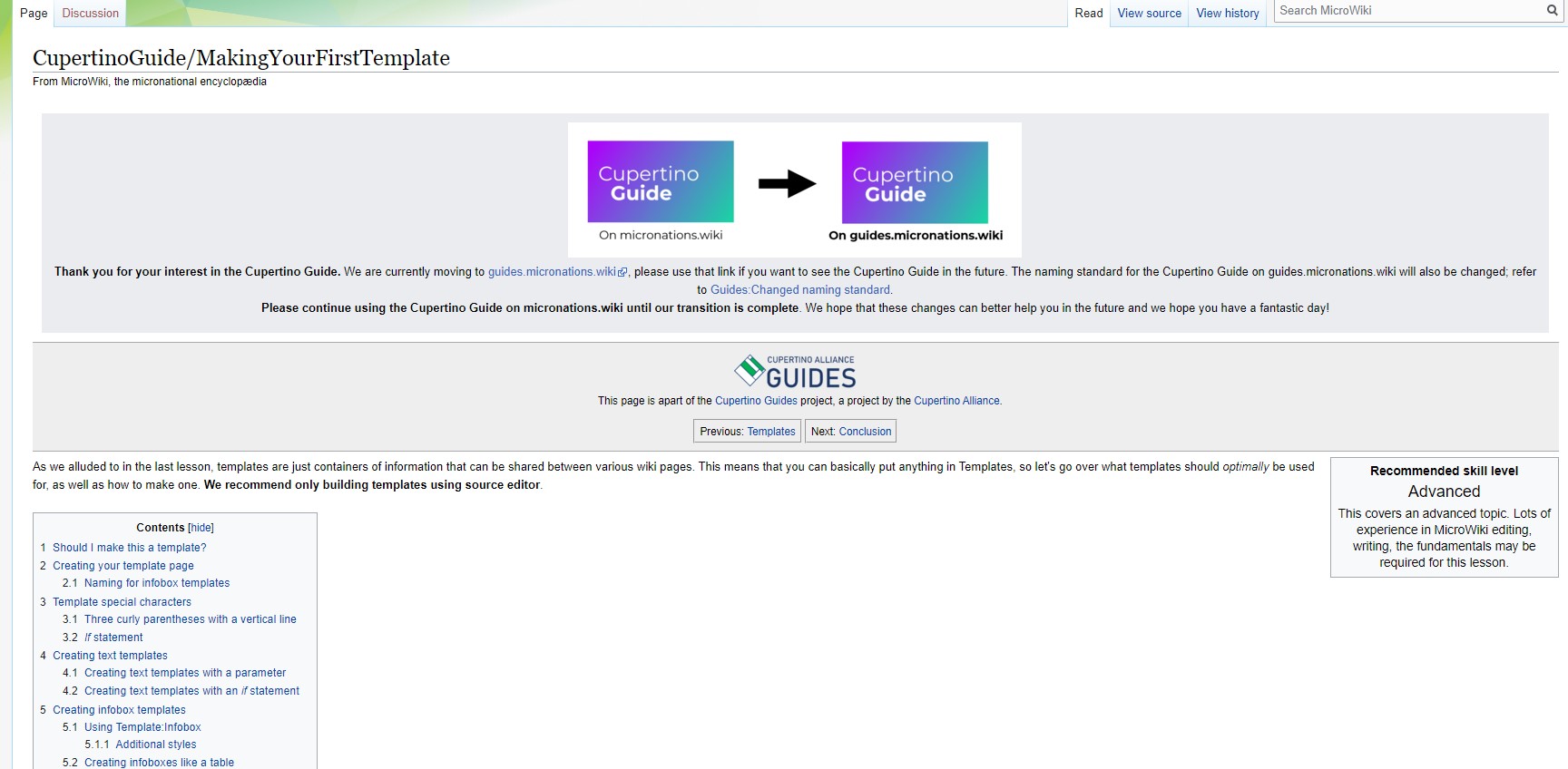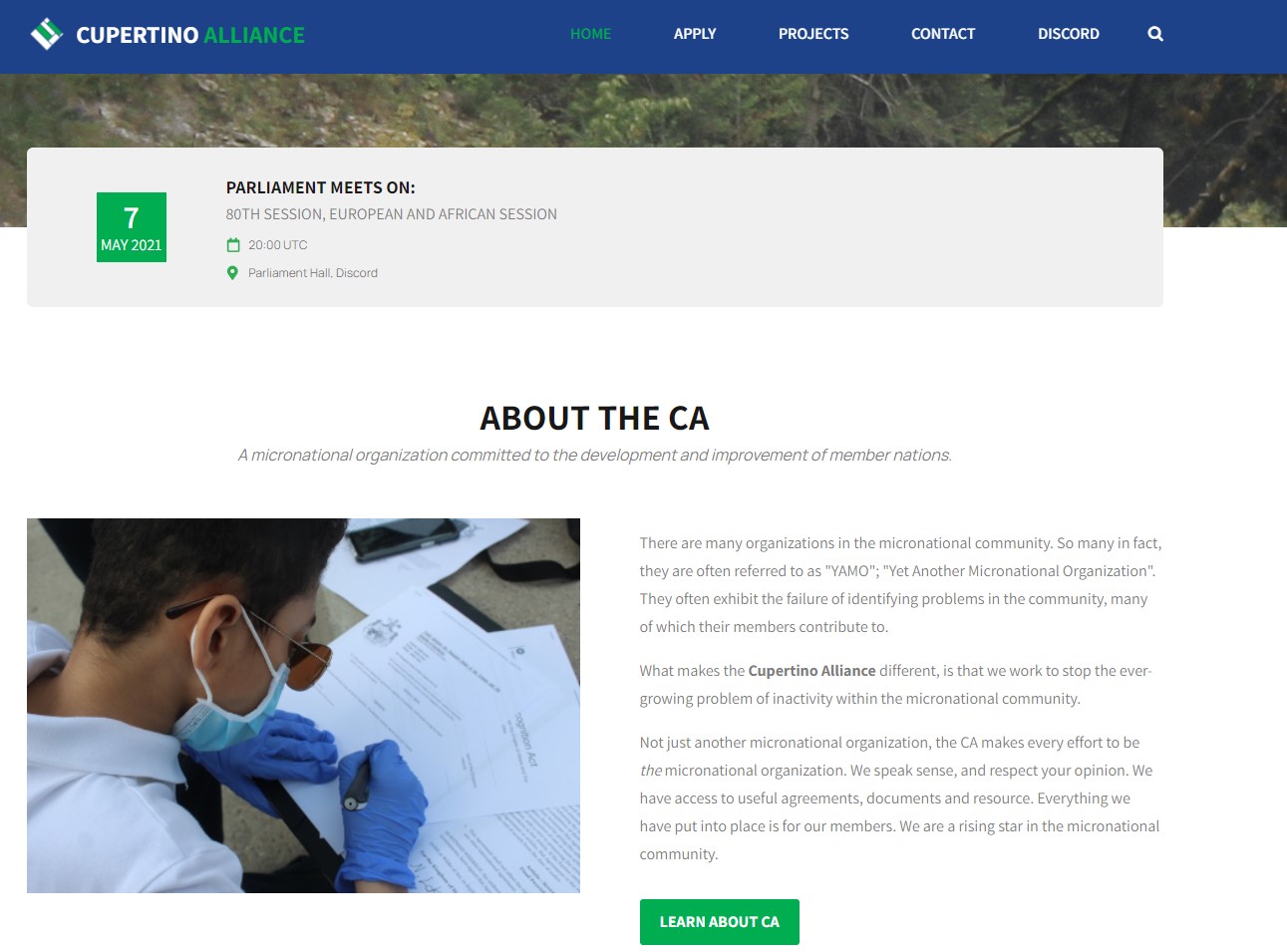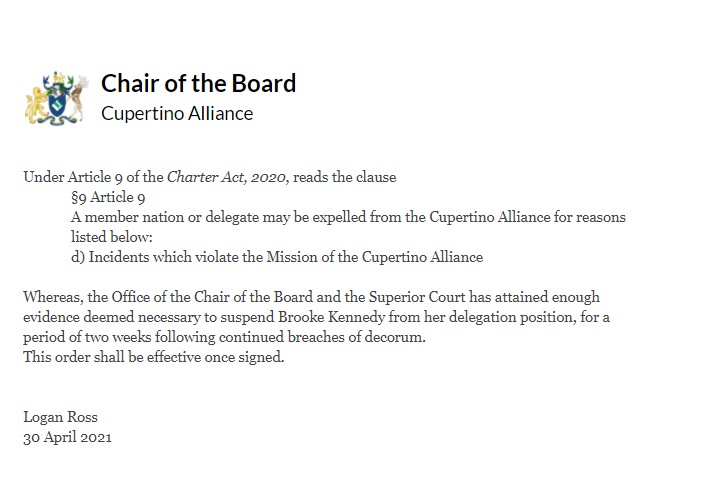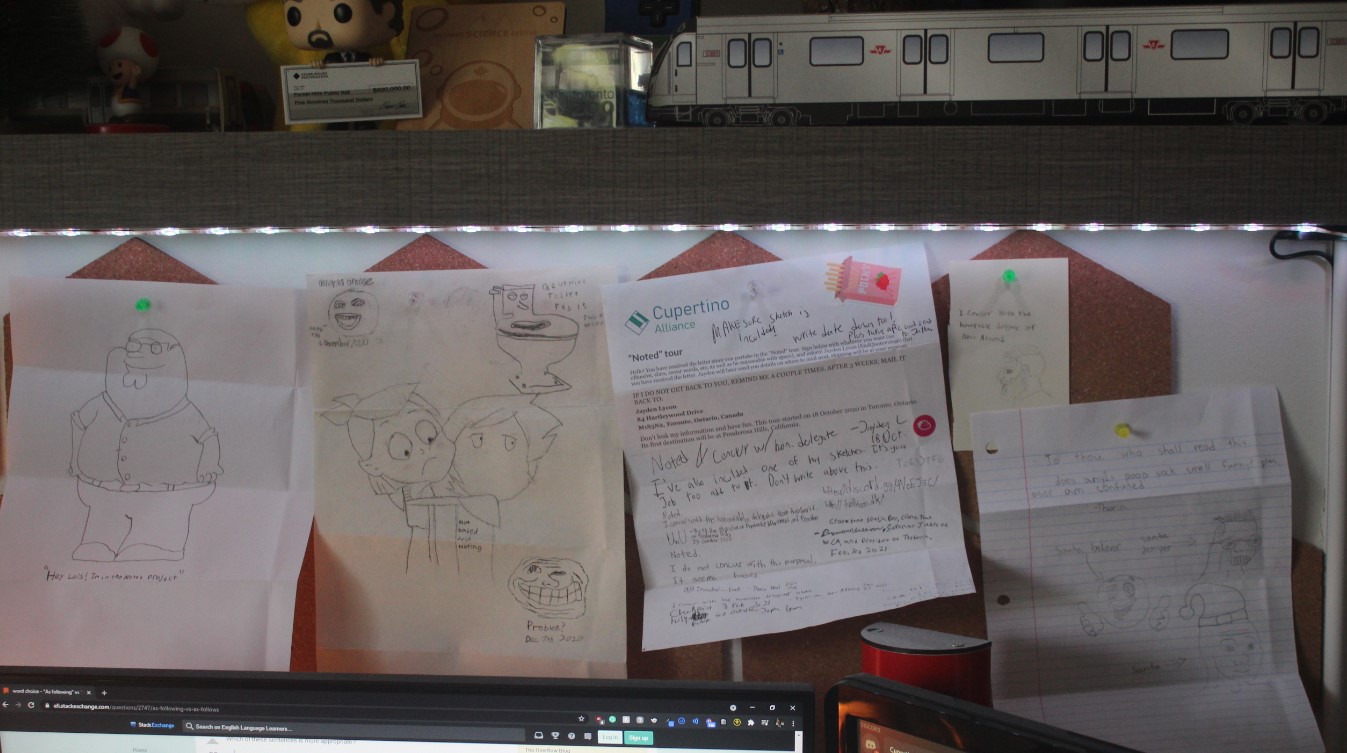
TORONTO, ON – The second chapter of the Cupertino Guide was finished on 30 April 2021 following weeks of work by both Lycon and Ross governments. This chapter, which covers how to use MicroWiki, was originally a part of the first chapter. The decision to split the Guide into two chapters was made in winter 2021, with work on the first chapter being paused.
The second chapter contains seven assignments, six full lessons (excluding conclusion and course outline), and all of the lessons add up to more than 100K+ bytes. The second chapter has received positive reviews, with it gaining popularity in MicroWiki@Discord.
I have already referred several new MicroWiki users to the Cupertino Guide, and they have had great success in writing their first MicroWiki article and learning about micronationalism as a whole. The Cupertino Guide is a valuable resource for new users, and I look forward to seeing it develop further in the future.
Daniel Hamilton, Minister of Asian and Oceanian Affairs (User:Australis)
Cupertino guides has been very helpful in showing new members of the micronational community the basic working of the wiki so more people can contribute. It’s something that should have been created ages ago so new members of the community wouldn’t have to rely on Wikipedia to learn to edit.
Matthew Hubbard, MicroWiki user (User:Mh06941)

The Cupertino Guide is planned to be moved at guides.micronations.wiki in the later future. This change was made so that users would have an easier way to access these guides, as well as being a hub for additional content added in the future.
Furthermore, the Chair also signed an executive proclamation, expanding the awards system to include the Pillar of Development awards, given to people who complete chapters of the Cupertino Guide, as well as its assignments.
After the finishing of the second chapter of the Cupertino Guide, work is expected to resume for the first chapter. The 1st chapter covers how to start a micronation, which will be presented in a similar form as chapter 2. The first chapter, however, will also contain templates for constitutions and declarations of independence; at least one of these documents are needed for Cupertino Alliance membership.
Major website updates

Speaking of online resources, the website, located at cupertinoalliance.ca, has received an extensive update. New content in the projects, contact, index, and application pages were added, a new JavaScript file which allows ministers to change the session times easily was tested, and work continues on adding a history tab. The website is also planned to include pages for parks in the Cupertino Area of Natural Interest program, pages for each member nation of the Cupertino Alliance, and updates relating to the Noted project.
During the late night of the second of May, the website was taken down by the webhost due to a false positive triggered by an automated system. The alliance is using this opportunity, however, to switch webhosts due to difficulties with the previous one. It’s likely that the alliance will transfer to a paid hosting service this week.
An archive version of the website dated from 25 April 2021 is viewable here.
Standing Committee for Bilateral Cooperation to Organizations Abroad formed
The Standing Committee for Bilateral Cooperation to Organizations Abroad was established, to research and initiate talks between various organizations, including the Conference of Santiago, ASPAA, and ASAM.
This was a product of various discussion during the 78th session, when Parliament discussed expanding relations to other areas including Asia and the French-speaking community.
Currently, the standing committee includes:
- Logan Ross (Aenopia at-large)
- Anthony (Saspearian at-large)
- Dhrubajyoti Roy (Vishwamitra’s 1st)
- Leon Montan (Ponderosa Hills’s 1st)
- Jayden Lycon (Qalfana’s 2nd)
- D. Rallis (Humberlea’s 2nd)
- James Bornstein (Desert District’s 1st)
Speaking of inter-organizational cooperation, Jack Dean, the Chair of the Grand Unified Micronational talked with the Summit and Events Standing Committee as a non-delegate member relating to possible cooperation with a clean-up event in the future.
3d election graphics? A possibility in the future
A very early test of animated three dimensional shapes was also released. The research of the test will contribute to a possible new election graphic for Cupertino Alliance members to use in the future.
This marks nearly one year after the launch of the previous election graphics, with great fanfare. Since then, it has been used by various member nations, including Yu-Xia, Aswington, and the former New Eiffel.
Suspension of Brooke Kennedy

Brooke Kennedy was suspended due to repeated violations of decorum in formal channels. Kennedy was formerly the delegate of Desert District, before being kicked from Desert District and moving to Ponderosa Hills.
Twin Town project
The Chair also established and started the paring between various settlements in the Twin Towns project, akin to the Grand Unified Micronational’s Sister City project. Quoted by Chair Logan Ross, the project aims to:
- Develop settlements by pairing them with similar cities;
- Create long-lasting bonds between settlements and nations ;
- Encourage growth within paired cities;
- Encourage partnerships between paired nations.
The current groupings are as follows:
Group A
New Llandudno, Aenopia
Arastraville, Ponderosa Hills
Cape Chad, Wegmat
Fort Emery, Humberlea
Group B
Ryanlandia, Desert District
Dadara, Vishwamita
Rocinante-Upon-Afon, Aenopia
Rosewell Province, New Athens
Group C
Unueco, Saspearian
Trumpetburgh, Revalia
Rajagriha, Vishwamitra
Humbermede Central, Humberlea
Second literation of the Noted project annouced

The first Noted tour
Finally, the applications for the second literation of the Noted project was also restarted, after the ending of the first. The first Noted project ran from 18 October 2020 to 5 February 2021, in light of the resignation of Jayden Lycon ten days later. The project ran across America and Canada, with various Cupertino Alliance delegates participating in states like New York and the province of Ontario, to Georgia and California. It is unknown where the second literation is planned to start.

One thought on “Guide on how to use MicroWiki finished; website updates; loads of project updates”